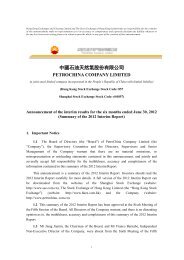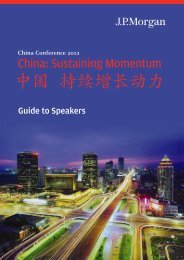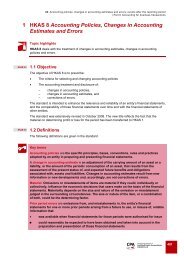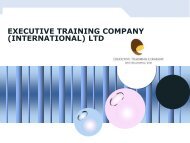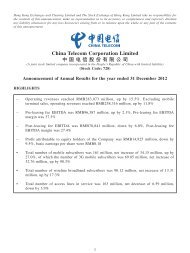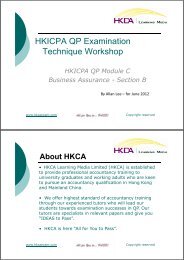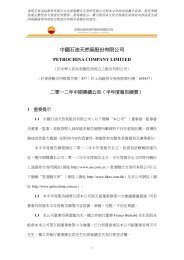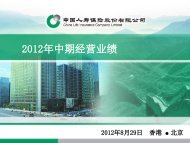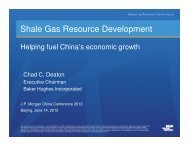Employer
Employer
Employer
You also want an ePaper? Increase the reach of your titles
YUMPU automatically turns print PDFs into web optimized ePapers that Google loves.
HKICPA and FTMS<br />
Module D – Taxation<br />
Module Preparation Seminar<br />
Patrick Ho<br />
LL.B, LL.M, MBA, MCS, FCPA, FCCA, FTIHK, PCLL<br />
Author of “Hong Kong Taxation and Tax Planning”<br />
Principal Lecturer, FTMS Training Systems (HK) Ltd,<br />
13 April 2012<br />
1
Agenda<br />
Major or Difficult Syllabus Topics (Part I)<br />
• Salaries tax:<br />
- Office, employment and pension<br />
- Employment benefits<br />
- Termination payments<br />
• IRD letters<br />
2
• Section 8(1) :<br />
Scope of Charge<br />
• Salaries tax shall be charged on income<br />
arising in or derived from Hong Kong<br />
from the following sources –<br />
Employment<br />
Office<br />
Pension<br />
3
Employment vs Office<br />
• Employment – A legal relationship of<br />
master and servant<br />
• Office – A permanent, subsisting,<br />
substantive position independent from<br />
the person who fills it, and which went<br />
on and was filled by successive holders.<br />
e.g. directors (Great Western Railway<br />
Case v Bater 1922)<br />
4
Employment vs Office<br />
• Employment – income includes salary,<br />
bonus, commission etc.<br />
• Office – major income is direct fee and<br />
includes fringe benefits.<br />
5
Who is an office holder?<br />
• Trade officer<br />
• Marketing director<br />
• Tax director<br />
• Director<br />
• Chief executive officer<br />
• Executive director<br />
• Managing director<br />
6
Arising In or Derived From<br />
• Applies the Territorial Concept<br />
• Need to Determine Hong Kong Sourced<br />
Office, Employment and Pension<br />
• Otherwise, Not Taxable<br />
7
Source of Office<br />
• Place where legal office exists<br />
• Practical concern is where the company<br />
is centrally managed and controlled<br />
(McMillan V Guest, D123/02)<br />
• Place where board of directors holds<br />
meeting for making policy decision<br />
• Irrespective of place of residence and<br />
work<br />
8
Example on Office<br />
• A director of a Hong Kong based<br />
company draws $500,000 in<br />
2009/2010 but never comes to Hong<br />
Kong and performs any duties.<br />
• Is director’s fee assessable to salaries<br />
tax?<br />
9
Pension vs Retirement Lump Sum<br />
• Pension : a periodic payment made after<br />
retirement – with a separate source of<br />
income different from employment and<br />
office.<br />
• Retirement Lump Sum : A lump sum<br />
payment made at the time of retirement – it<br />
is a part of employment income with the<br />
source rule of employment.<br />
10
Source of Pension<br />
• The source of pension is at the place where<br />
the pension fund is managed.<br />
• If a pension fund is managed outside Hong<br />
Kong, the pension is 100% exempt from<br />
salaries tax. If a pension fund is managed in<br />
Hong Kong, only the portion of pension<br />
attributable to Hong Kong service is<br />
taxable.<br />
11
Contract of Service vs Contract for Service<br />
Contract of Service<br />
• A person is under an employment<br />
• Also referred as “being employed”<br />
• Income chargeable under salaries tax<br />
Contract for Service<br />
• A person runs his own business<br />
• Also referred as “self-employed”<br />
• Income chargeable under profits tax<br />
12
Tests for Distinguishing<br />
Contract of Service and Contract for Service<br />
• Control test<br />
• Integration test<br />
• Economic reality test<br />
13
• Two-tier Test :<br />
Source of Employment<br />
3 factors in DIPN 10<br />
Totality of facts approach<br />
14
Source of Employment<br />
• 3 Factors in DIPN 10 :<br />
Where the contract is negotiated /<br />
concluded / enforceable<br />
Place of residence of employer<br />
Where employee’s remuneration is paid<br />
15
Source of Employment : 3 Factors in DIPN 10<br />
• If the contract is negotiated concluded / enforceable<br />
outside Hong Kong, and<br />
• Place of residence of employer outside Hong Kong,<br />
and<br />
• Employee’s remuneration is paid outside Hong<br />
Kong, then<br />
– The employment is generally treated as sourced<br />
outside Hong Kong.<br />
If any one of the three factors is in Hong Kong, the<br />
employment is sourced in Hong Kong.<br />
16
Source of Employment : Totality of Facts<br />
• Totality of Facts Approach :<br />
– Where is the employment contract<br />
enforceable?<br />
– What is the nature of duties?<br />
– Whether hold a post in / has employment<br />
with a HK co.?<br />
– Who pays / bears the remuneration?<br />
– Is remuneration an expense of a HK co.?<br />
– Are overseas duties incidental to HK duties?<br />
17
Board of Review Case – D87/00<br />
Although the three critical factors are outside<br />
Hong Kong, CIR may still treat the employment<br />
sourced in Hong Kong if other factors prove so.<br />
CIR may rely on the “Totality of Facts” approach<br />
in deciding the Source of Employment.<br />
It is the taxpayer’s Burden of Proof to prove that<br />
the employment is sourced outside Hong Kong.<br />
18
Non-Hong Kong Employment<br />
The Extended Charge – Section 8(1A)(a)<br />
• Income arising in or derived from Hong<br />
Kong includes all incomes derived from<br />
services rendered in Hong Kong<br />
[s.8(1A)(a)]<br />
• Effectively imposes charge on income for<br />
services rendered in Hong Kong in respect<br />
to non-Hong Kong sourced employment.<br />
19
Impact of s.8 (1) & (1A)(a)<br />
• Local employment charged on full<br />
salaries income – S.8(1)<br />
• Overseas employment charged only on<br />
services rendered in Hong Kong,<br />
effectively counted on number of days<br />
of services including proportion of<br />
holidays – S.8(1A)(a)<br />
20
Employment : Exemption from Salaries Tax<br />
• when all services are rendered outside<br />
Hong Kong, or<br />
• 60-day rule of visit (i.e. an individual<br />
stays in Hong Kong for 60 days or<br />
lessin a year of assessment)<br />
21
Visits<br />
• Normally no permanent base in Hong<br />
Kong<br />
• Not with the intention to stay for work<br />
on a continuous basis<br />
22
Employment : Exemption from Salaries Tax<br />
• Exemption of all services outside Hong<br />
Kong and 60-day rule of visit NOT<br />
APPLIED to:<br />
• Office (i.e. director)<br />
• Government employees<br />
• Sailors, air crew or seafarers<br />
23
60-day Rule of Visit<br />
Apply to both:<br />
– Hong Kong source employment, and<br />
– Non-Hong Kong source employment<br />
24
60-day Rule of Visit<br />
for Hong Kong Source Employment<br />
• All service done in HK 100% taxable<br />
• Some service done in HK 100% taxable<br />
• All service done outside HK 100% exempt<br />
• Service is done in HK during visit:<br />
- for 60 days or less 100% exempt<br />
- for more than 60 days 100% taxable<br />
25
60-day Rule of Visit<br />
for Non-Hong Kong Source Employment<br />
• All service done in HK 100% taxable<br />
• Some service done in HK time-basis taxable<br />
• All service done outside HK 100% exempt<br />
• Service in done in HK during visit:<br />
- for 60 days or less 100% exempt<br />
- for more than 60 days time-basis taxable<br />
26
Relief for Hong Kong source income<br />
taxed in an overseas country<br />
• Income exclusion rule under section<br />
8(1A)(c)<br />
• Tax credit paid in overseas countries set off<br />
against Hong Kong salaries tax payable.<br />
27
Exemption under Section 8(1A)(c)<br />
• Two conditions are required to be<br />
satisfied before the relief under<br />
s.8(1A)(c) is allowed :<br />
– When works in a country with similar tax<br />
rules as those of HK salaries tax; and<br />
– Actually paid tax on that part of income<br />
to that foreign country<br />
28
Dual Capacity<br />
• Holds Office as well as Employment<br />
• Divide remuneration between office<br />
and employment<br />
• Different rules apply<br />
29
183-day Rule of<br />
Anti-Double Tax Arrangement<br />
• 183-day rule with non-residents<br />
coming from countries or places<br />
signed with a double taxation<br />
arrangement with Hong Kong<br />
30
183-day Rule of<br />
Anti-Double Tax Arrangement<br />
• This is different from 60-day rule of visit.<br />
• Mainland Chinese is commonly used in examinations.<br />
• The conditions for exemption are Mainland Chinese :<br />
not employed by a Hong Kong company, and<br />
staying in Hong Kong for 183 days or less in Hong<br />
Kong in any continuous period of 12 months<br />
commencing and ending in the year of assessment,<br />
then, he or she is exempt from Hong Kong salaries tax.<br />
31
183-day Rule of<br />
Anti-Double Tax Arrangement<br />
- Mainland Chinese stays in Hong Kong for 183 days or<br />
less in Hong Kong in a continuous period of 12 months<br />
commencing and ending in the year of assessment, he or<br />
she is exempt from Hong Kong salaries tax if :<br />
- he or she is not employed by a HK company, and<br />
- his or her income is not finally borne by a HK company<br />
32
Crews of Ship & Aircraft – S8(2)(j)<br />
• Income not assessable if physical<br />
presence in HK :<br />
– Not more than 60 days in total in the year<br />
of assessment, and<br />
– Not more than 120 days in total for 2<br />
consecutive years of assessment<br />
33
Employment Income<br />
Chargeable with Salaries Tax<br />
Two Basic Principles:<br />
• The receipt of income is derived from an<br />
employment, and<br />
• The income is in the consideration of<br />
services performed in the past, present and<br />
future.<br />
34
Test of Income from Employment<br />
• Is the receipt customarily expected?<br />
• Is the receipt provided in the contract of<br />
employment?<br />
• Is the payment made for reasons other<br />
than services rendered?<br />
• Is it a gift or compensation?<br />
35
Income Not Related to Employment<br />
• If payment is remuneration for past,<br />
present or future services, it is taxable.<br />
• Voluntary payments for personal<br />
reasons are generally not taxable.<br />
• Compensation for loss of rights is<br />
generally not taxable.<br />
• A payment for agreeing to a restrictive<br />
covenant is generally not taxable.<br />
36
Example on <strong>Employer</strong>’s Voluntary Payment<br />
• <strong>Employer</strong> gives an employee a lump<br />
sum of $50,000 voluntarily in<br />
recognition of the employee’s good<br />
performance.<br />
• Is this subject to salaries tax?<br />
37
Example on <strong>Employer</strong>’s Voluntary Payment<br />
• An employer gives a birthday gift of<br />
$1,000 to the employee on his birthday.<br />
• Is this subject to salaries tax?<br />
38
Section 9(1)(a)<br />
• Income from Office or Employment<br />
– Wages, Salary, Leave Pay<br />
– Fee, Commissions<br />
– Bonus, Gratuity<br />
– Perquisite or Allowance<br />
– Holiday journey actually spent, irrespective of control<br />
– Employee’s child education expenses paid by<br />
employer, irrespective who is liable to pay<br />
– Whether Paid by <strong>Employer</strong> or Others<br />
39
Other Benefit Items<br />
• Housing benefits : s.9(1)(b) and (c)<br />
• Share options : s.9(1)(d)<br />
• Share award : DIPN 38<br />
• Benefits convertible into cash : s.9(2A)(a)<br />
• Child education allowances : s.9(2A)(b)<br />
• Holiday journey : s.9(2A)(c)<br />
• Withdrawal in excess of proportional benefits<br />
under approved ORSO / MPF schemes : S.8(4)<br />
40
Assessable Income<br />
• That item of income which should be<br />
included in the calculation of total income<br />
for Salaries Tax purpose<br />
• Should be the aggregate amount of income<br />
accruing to a person from all services<br />
41
Summary of Income Chargeable to Salaries Tax<br />
Specific Treatment<br />
Accommodation<br />
Rental refund<br />
Share option<br />
Share award<br />
Holiday journey<br />
Employee child’s<br />
education expenses<br />
Provident fund<br />
Whether<br />
liability borne<br />
by employee<br />
If no, exempt;<br />
If yes, taxable.<br />
General Taxation Principle<br />
Whether<br />
benefit<br />
convertible<br />
into cash<br />
If no, exempt;<br />
If yes, taxable<br />
on second-<br />
hand value.<br />
Whether<br />
enjoying<br />
employer’s<br />
facility<br />
If yes,<br />
exempt.<br />
42
Fringe Benefits (Benefits in Kind)<br />
Principle of Charge of Salaries Tax<br />
• Benefit capable of being converted into money by<br />
the recipient – income taxed at second hand value<br />
• Payment is used to discharge the liability of an<br />
employee, not the liability of an employer<br />
• (Study page 111 of Hong Kong Taxation and Tax<br />
Planning and Learning Pack of QP Module D)<br />
43
Fringe Benefits (Benefits in Kind)<br />
• Fringe Benefits specified in the IRO that<br />
they are taxable at the cash equivalent<br />
– <strong>Employer</strong> discharges an employee’s liability<br />
– <strong>Employer</strong> pays school fee of an employee’s<br />
child even though the arrangement is that the<br />
employer discharges his own liability<br />
44
Fringe Benefits : Holiday Journey<br />
• Fringe Benefits specified in the IRO that they are<br />
taxable at the cash equivalent<br />
– <strong>Employer</strong> provides holiday journey (such as<br />
purchase of air ticket or holiday package, etc., for<br />
an employee) unless<br />
a. the employer does not incur any additional cost in<br />
the provision of such benefit; or<br />
b. an expatriate employee for the first time he came<br />
to Hong Kong to take up his or her post, or<br />
c. his or her departure from Hong Kong after the<br />
employment has been terminated.<br />
45
Section 9(1)(a)(iv)<br />
• Payment by <strong>Employer</strong> to Third Party in<br />
discharge of Employee’s Primary Liabilities<br />
• Identity of Liabilities is Crucial --<br />
– If employee has no liability, not<br />
assessable<br />
– If employee has liability or obligation to<br />
liability, assessable<br />
46
DIPN 16 : Taxation of Fringe Benefits<br />
For Benefits to be Included as Income<br />
• Receipt of Cash or Cash Equivalent<br />
• Convertible to Cash<br />
• Discharge of Liabilities Committed by<br />
Employee<br />
47
DIPN 16 : Taxation of Fringe Benefits<br />
• Confirm the Liability Test<br />
• Specific Exclusion of Certain Benefits<br />
– Company car provided by employer<br />
– Recreational facilities provided by employer<br />
– Payment of utilities with the bill in the name of<br />
employer<br />
– Interest free or low interest-rate loans provided<br />
by employer<br />
– Club benefits in the name of employer<br />
48
DIPN 16 : Taxation of Fringe Benefits<br />
• Special Tax Treatment on Private Expenses Paid<br />
with <strong>Employer</strong>’s Credit Card<br />
• Although it is the liability of employer to settle the<br />
monthly statements of the corporate credit card,<br />
the benefit is chargeable to the employee’s salaries<br />
tax liability based on Liability Test.<br />
Reason :<br />
• It is the employee’s primary liability to settle the<br />
private expenses on the spot.<br />
49
Housing Benefits<br />
Three different kinds of housing benefits<br />
• cash allowance / rental allowance<br />
• provision of quarters free or at a<br />
reduced rate<br />
• reimbursement of rent with or without<br />
charge to employee<br />
50
• Section 9(1)(b)<br />
Provision of Residence<br />
• Residence provided rent free - calculated at<br />
rental value as a percentage of income -<br />
– 4% for one room in hotel or hostel<br />
– 8% for two rooms in hotel or hostel<br />
– 10% for other cases<br />
• Must be private and feasible for family<br />
accommodation<br />
51
• Section 9(1)(c)<br />
Excess of Rental Value<br />
• Where residence is provided at a rent<br />
less than the rental value<br />
• Included as income that part of excess<br />
of rental value<br />
52
Reimbursement of Rent (Rental Refund)<br />
• Where residence is provided in terms of<br />
reimbursement of rent -<br />
• General rule of convertibility to cash is<br />
applied<br />
• Sufficient Control must be exercised for<br />
reimbursement amount<br />
• Otherwise treated as cash receipts<br />
53
What is Sufficient Control?<br />
• Duly Stamped Rental Agreement –<br />
Normally no direct relationship<br />
• Rental terms and conditions are reasonable<br />
• Monthly or periodic rental receipts<br />
• Notification of changes required from<br />
employee<br />
• Employees’ integrity is normally assumed<br />
54
CIR v P.L.Page (2003)<br />
• Taxpayer contracted with employer with a term<br />
of housing reimbursement<br />
• <strong>Employer</strong> paid the maximum amount without<br />
identifying the actual rent paid by employee<br />
• Employee paid actual rents that were more than<br />
the capped maximum amount reimbursed by<br />
employer<br />
55
CIR v P.L.Page (2003) (Con’t.)<br />
• Held: the capped amount “paid back” to Page<br />
was taxable<br />
What did we learn?<br />
• Terms of contract a starting point & a<br />
weighty factor, but not the SOLE test<br />
• Conducts of parties varied the terms of<br />
contract<br />
56
Example on Rental Refund<br />
• David receives salaries of $1,000,000.<br />
• He rented a flat at $40,000 pm, and the employer<br />
refunded $37,000 pm based on production of rental<br />
receipts.<br />
• What amount of rental value will be included as<br />
income?<br />
• $1,000,000 x 10% – 12 x ($40,000 – $37,000)<br />
= $64,000<br />
• Total assessable income=$1,000,000 + $64,000<br />
= $1,064,000<br />
57
Reimbursement (or refund) of Rents<br />
• If IRD accepts the sum of $444,000<br />
($37,000 x 12) relates to reimbursement of<br />
rents, this amount is NOT included as<br />
Assessable Income<br />
• If IRD considers the sum more of a cash<br />
payment without specific purpose (e.g.<br />
because of insufficient control), the whole<br />
amount of $444,000 is assessed<br />
58
• Accept as Rental<br />
Reimbursement:<br />
Impact of Control on<br />
Reimbursement of Rents<br />
• Salaries $1,000,000<br />
• Rent Reimbursement<br />
$444,000<br />
• Total Assessable<br />
Income $1,064,000<br />
• View as Cash<br />
Payment:<br />
• Same data as in the left<br />
hand side<br />
• Total Assessable<br />
Income :<br />
• $1,000,000 + $444,000<br />
• =$1,444,000<br />
59
Different Tax Liabilities<br />
with Same Gross Income<br />
• Thus, it is clear that with the same amount<br />
of cash income ($1,444,000), tax liabilities<br />
can be drastically different because of rental<br />
arrangement.<br />
• This is an example of Salaries Tax Planning<br />
60
Gain on Share Options : DIPN 38<br />
• Granting of share options by the employer or<br />
related corporations does not constitute income<br />
• Benefits deemed received at time employee<br />
could notionally gain the benefits – s.9(1)(d)<br />
and D43/99.<br />
• Benefits recognized even with restrictions to<br />
sell – D120/02.<br />
• Subsequent transactions do not relate to<br />
employment<br />
61
Grant<br />
of Option<br />
Not<br />
Taxable<br />
Procedure of Grant of Share of Option<br />
Exercise<br />
of Option<br />
Taxable<br />
Market value at date of exercise A<br />
– option cost B<br />
– subscription cost C D<br />
Taxable Gain E<br />
Sale<br />
of Shares<br />
Not<br />
Taxable<br />
62
Example on Share Option<br />
• Option granted by employer on 1/2/2011 to<br />
buy 100,000 shares at $5, when market price is<br />
$10 per share<br />
• On 15/2/2012, exercises the option when<br />
market price is $15 per share<br />
• On 15/4/2012, sells the share in the market at<br />
$20 per share<br />
• What if the shares are sold at $12 per share?<br />
63
Gain on Share Options<br />
• In case that an employee does not exercise the<br />
option, but sell the option to another employee<br />
or sell back the option to the employer,<br />
• taxable gain = amount received – cost incurred<br />
64
Reference to :<br />
• Open market value<br />
• Restrictions on sale<br />
• Quoted shares<br />
• “Slump effect”<br />
Valuation of Shares<br />
• Brokerage, stamp duty or other charges<br />
• Unquoted shares<br />
65
Share Option : Restrictions on Sale of Shares<br />
• Share options are sometimes granted on the<br />
condition that restrictions will apply in<br />
relation to the disposal of any shares<br />
acquired under the scheme (e.g. as to when<br />
or to whom the shares can be sold).<br />
• The restriction on disposal of the shares are<br />
relevant in determining the amount “which<br />
a person might reasonably expect to obtain<br />
from a sale in the open market”.<br />
66
Share Option : Restrictions on Sale of Shares<br />
• This is a valuation exercise to be undertaken<br />
in the light of the facts of each particular<br />
case.<br />
• See for example, D120/02, IRBRD vol. 18,<br />
125, where a 25% discount was allowed to<br />
reflect the five year restriction period<br />
against alienation of the shares.<br />
67
Valuation of Quoted Shares<br />
• Where the shares are listed on a stock<br />
exchange,<br />
• the open market value of the shares<br />
acquired can be taken as the closing<br />
quotation value for shares of the same kind<br />
on the date the option is exercised.<br />
68
Valuation of Quoted Shares : Slump Effect<br />
• In practice, the Department will consider a request<br />
for downward adjustment of the quoted value if<br />
there is evidence to suggest that,<br />
• because of the number involved, a sale of the<br />
shares obtained from exercising the option would<br />
only be possible at a reduced price,<br />
• i.e. a “slump effect” would be induced if the shares<br />
in question were to be made available for sale.<br />
• This practice reflects the decision of the Board of<br />
Review in case D46/95, IRBRD, vol. 10, 308.<br />
69
Shares Listed in HK and Overseas<br />
• If the shares are listed in Hong Kong and<br />
overseas at the same time, it is normal<br />
practice for the Department to adopt the<br />
price quoted on the Hong Kong Stock<br />
Exchange.<br />
• If the shares are listed on two non-Hong<br />
Kong exchanges, the taxpayer may select<br />
the more favourable price.<br />
70
Notional Expenses For Quoted Shares<br />
• Once the open market value of the shares is<br />
ascertained, it is accepted that any<br />
brokerage,<br />
stamp duty or<br />
other charges<br />
• that would have been levied if the notional<br />
sale had actually taken place.<br />
71
Unquoted Shares<br />
• For unquoted shares, if it is not possible to<br />
say that for all such companies there is a<br />
single valuation method, e.g. reference to;<br />
• “dividend yield”,<br />
• “earnings yield” or<br />
• “asset backing”.<br />
72
DIPN 38 : Example 1<br />
• The taxpayer had a Hong Kong employment.<br />
He was granted an unconditional right to<br />
subscribe for shares. He ceased employment<br />
and exercised his option after cessation of<br />
employment.<br />
73
Answer to DIPN 38 : Example 1<br />
• Cessation of employment does not prevent<br />
the application of the share option<br />
provisions. As the taxpayer concerned had a<br />
Hong Kong employment at the time of grant<br />
of the right, the relevant income was<br />
derived from Hong Kong and accordingly is<br />
chargeable to Salaries Tax in the year of<br />
assessment in which the right is exercised.<br />
• This approach has been endorsed in CIR v.<br />
Sawhney, Subhash Chander, HCIA 1/2006.<br />
74
DIPN 38 : Example 2<br />
• The taxpayer had a Hong Kong employment.<br />
All services were rendered in Hong Kong<br />
prior to and during the year the unconditional<br />
grant of the right was granted to him.<br />
• During the year of assessment in which the<br />
right was exercised, the taxpayer rendered all<br />
services outside Hong Kong in connection<br />
with the same employment.<br />
75
Answer to DIPN 38 : Example 2<br />
• As the taxpayer had a Hong Kong<br />
employment, the gain would be treated as<br />
having been derived from Hong Kong.<br />
• The gain would only be excluded from the<br />
charge to Salaries Tax by virtue of section<br />
8(1A)(b)(ii), taking into account section<br />
8(1B), if all services were rendered outside<br />
Hong Kong in the year of grant of the right.<br />
76
Answer to DIPN 38 : Example 2 (Con’t.)<br />
• The gain, calculated in accordance with<br />
section 9(4), would fall for assessment in the<br />
year of assessment in which the right was<br />
exercised.<br />
• The fact that the taxpayer did not render any<br />
services in Hong Kong during the year of<br />
exercise would not in itself have any bearing<br />
on whether the gain would be chargeable to<br />
Salaries Tax, see D4/02, IRBRD, vol. 17, 400.<br />
77
DIPN 38 : Example 3<br />
• The taxpayer had a Hong Kong employment.<br />
All services were rendered outside Hong<br />
Kong in the year of assessment in which the<br />
right was unconditionally granted, but<br />
rendered inside Hong Kong during the year<br />
of assessment in which the right was<br />
exercised.<br />
78
Answer to DIPN 38 : Example 3<br />
• As the taxpayer rendered all services outside Hong<br />
Kong during the year of assessment in which the<br />
right was granted, and as it was granted on an<br />
unconditional basis which did not involve services<br />
being rendered in Hong Kong, it would be<br />
accepted that the gain on realization should<br />
qualify for exemption by virtue of section<br />
8(1A)(b)(ii), taking into account section 8(1B),<br />
notwithstanding the fact that the taxpayer was<br />
rendering services in Hong Kong during the year<br />
in which the right was actually exercised.<br />
79
DIPN 38 : Example 4<br />
• The taxpayer had a Hong Kong employment. The right<br />
was conditionally granted, subject to the completion of<br />
a vesting period of 2 years from 1.4.2000. The position<br />
during the vesting period was as follows:<br />
Year ended<br />
31.3.2001<br />
31.3.2002<br />
More than 60 days in Hong Kong<br />
rendering services<br />
No services rendered in Hong Kong<br />
He exercised the option on 1.7.2002. During the year<br />
ended 31.3.2003, he did not render service in Hong Kong.<br />
80
Answer to DIPN 38 : Example 4<br />
• The chargeability of any gain on exercise would<br />
not hinge on where (or if) the taxpayer was<br />
rendering services in the year of assessment in<br />
which the right was exercised.<br />
• For a Hong Kong employment case, income can<br />
only be excluded from the charge to Salaries Tax<br />
if the taxpayer renders outside Hong Kong all the<br />
services in connection with his employment<br />
(taking into account the 60 days allowance<br />
provided under section 8(1B)).<br />
81
Answer to DIPN 38 : Example 4 (Con’t.)<br />
• Accordingly, having regard to the latter point in<br />
the previous paragraph, if during any year of<br />
assessment included in the vesting period, the<br />
taxpayer rendered services in Hong Kong during<br />
visits exceeding 60 days, all of the gain from the<br />
exercise of the option would be chargeable to<br />
Salaries Tax.<br />
• On the other hand, if during each such year the<br />
taxpayer’s visits did not exceed a total of 60 days,<br />
no part of the gain would be treated as chargeable<br />
(section 8(1A)(b)(ii) and (1B) would apply).<br />
82
Non-Hong Kong Employment<br />
• Where a person has a non-Hong Kong employment<br />
at the time of grant, the gain will have a non-Hong<br />
Kong source and will not be chargeable to Salaries<br />
Tax unless it is derived from services rendered in<br />
Hong Kong.<br />
• IRD will generally accept that no liability to<br />
Salaries Tax arises where a right is granted on an<br />
unconditional basis (or on completion of a vesting<br />
period of a conditional grant) prior to a person<br />
rendering any services in Hong Kong,<br />
notwithstanding that the right may be exercised<br />
after the person commences to render such services.<br />
83
Non-Hong Kong Employment (Con’t.)<br />
• Where a person with a non-Hong Kong<br />
employment is granted the right subject to a<br />
vesting period during which services are<br />
rendered both in and outside Hong Kong,<br />
• the gain can be partly attributed to services<br />
in Hong Kong, the benefit should to some<br />
extent be chargeable to Salaries Tax.<br />
84
Calculation of Gain on Share Option<br />
for Non-Hong Kong Employment<br />
In the case of a non-Hong Kong employment,<br />
however, the Department will generally accept<br />
that it is equitable to have regard to<br />
• the number of days in Hong Kong plus leave days<br />
attributable to services in Hong Kong<br />
• during the period from the date of conditional<br />
grant to the date the employee became<br />
unconditionally entitled to exercise the right (i.e.<br />
the vesting period) to the total number of days in<br />
the period,<br />
• notwithstanding that it may only be exercised after<br />
a further period.<br />
85
Taxable<br />
Gain<br />
Calculation of Gain on Share Option<br />
for Non-Hong Kong Employment<br />
=<br />
Days in Hong Kong plus<br />
attributable leave<br />
during vesting period<br />
Total number of days in<br />
the vesting period<br />
x<br />
Chargeable<br />
gain<br />
86
DIPN 38 : Additional Example (para. 48)<br />
• Mr. A is an expatriate working for an overseas<br />
company chargeable on time-basis on employment<br />
income.<br />
• He has a share option with vesting period from<br />
1.1.2001 – 31.12.2002 (730 days).<br />
• He rendered services in Hong Kong as visit:<br />
40 days in year of assessment 2000/2001,<br />
252 days in year of assessment 2001/2002,<br />
0 day in year of assessment 2002/2003.<br />
• He exercised the option in April 2002.<br />
Question: How to assess gain on share option?<br />
87
Answer to Additional Example (para. 48)<br />
• The gain is taxable in year of assessment 2002/2003.<br />
• The taxable gain = Total gain x (days of chargeable<br />
income in 2000/2001 + 2001/2002 + 2002/2003) / 730<br />
= Total gain x (0 + 252 + 0) / 730<br />
• Year of Assessment 2000/2001 : No income is<br />
assessable as Mr. A was less than 60 days in HK.<br />
• Year of Assessment 2002/2003 : No income is<br />
assessable as Mr. A did not carry out service in HK.<br />
• Year of Assessment 2001/2002 : No. of days = 252<br />
88
DIPN 38 : Example 5<br />
• The taxpayer had a non-Hong Kong<br />
employment.<br />
• All services were rendered outside Hong<br />
Kong in the year of assessment in which the<br />
right was unconditionally granted,<br />
• but rendered inside Hong Kong during the<br />
year of assessment in which the right was<br />
exercised.<br />
89
Answer to DIPN 38 : Example 5<br />
• As the taxpayer rendered all services outside<br />
Hong Kong during the year of assessment in<br />
which the right was granted, and<br />
• as it was granted on an unconditional basis that<br />
did not involve services being rendered in Hong<br />
Kong,<br />
• the right would accordingly be recognised as<br />
having been derived from services rendered<br />
outside Hong Kong.<br />
• As such, the gain on exercise of the right would<br />
not be chargeable to Salaries Tax.<br />
90
DIPN 38 : Example 6<br />
• The taxpayer had a non-Hong Kong<br />
employment.<br />
• All services were rendered in Hong Kong<br />
during the year of assessment in which the<br />
right was unconditionally granted,<br />
• but during the year of assessment in which the<br />
right was exercised, the taxpayer rendered all<br />
services in connection with the employment<br />
outside Hong Kong.<br />
91
Answer to DIPN 38 : Example 6<br />
• As the taxpayer rendered all services in<br />
connection with the employment in Hong<br />
Kong during the year of assessment in which<br />
the right was granted, and as it was granted<br />
on an unconditional basis which did not<br />
involve services being rendered outside Hong<br />
Kong,<br />
• the gain on exercise would be fully<br />
chargeable to Salaries Tax in the year of<br />
exercise of share option.<br />
92
DIPN 38 : Example 7<br />
• The taxpayer had a non-Hong Kong<br />
employment.<br />
• Services were rendered inside and outside<br />
Hong Kong :<br />
during the year of assessment in which the<br />
right was unconditionally granted and<br />
during the year in which it was exercised.<br />
93
Answer to DIPN 38 : Example 7<br />
• If the right was unconditionally granted to the<br />
taxpayer after he had commenced to render<br />
services in Hong Kong, part of the gain would be<br />
regarded as having been derived from services<br />
rendered in Hong Kong.<br />
• Accordingly, the assessable portion would be<br />
calculated using “time basis” ratio applied in the<br />
year of assessment of the grant.<br />
• The fact that the taxpayer rendered some services<br />
in Hong Kong during the year of assessment in<br />
which the right was exercised would not in itself<br />
have any bearing on whether the gain on exercise<br />
would be chargeable to Salaries Tax.<br />
94
DIPN 38 : Example 8<br />
• The taxpayer had a non-Hong Kong<br />
employment.<br />
• The right was conditionally granted subject to<br />
the completion of a vesting period during<br />
which services were rendered partly inside<br />
and partly outside Hong Kong.<br />
95
Answer to DIPN 38 : Example 8<br />
• In a case involving a non-Hong Kong<br />
employment, because of the terms of<br />
section 8(1A)(a), it is necessary to ascertain<br />
the extent to which the income (i.e. the gain<br />
on exercise) was derived from services<br />
rendered in Hong Kong.<br />
• The assessable portion would be chargeable<br />
to Salaries Tax in the year of assessment in<br />
which the right was exercised.<br />
96
DIPN 38 : Example 9<br />
• The taxpayer had a non-Hong Kong<br />
employment at the time when the option was<br />
conditionally granted subject to the<br />
completion of a vesting period during which<br />
the taxpayer’s employment was changed to a<br />
Hong Kong employment within the same<br />
group of companies.<br />
• Issue: How to handle changes from Hong<br />
Kong to non-Hong Kong employment or vice<br />
versa during vesting period<br />
97
Answer to DIPN 38 : Example 9<br />
• As the option was derived by the taxpayer from both<br />
the non-Hong Kong employment and the Hong Kong<br />
employment, it is necessary to apportion the share<br />
option gain, which can be done by simple time<br />
apportionment, to ascertain the amount of the gain<br />
attributable to each employment.<br />
The portion attributable to the Hong Kong<br />
employment : fully assessed or fully exempt.<br />
The portion of the gain attributable to the non-Hong<br />
Kong employment : fully exempt or further<br />
apportioned.<br />
98
Share Award<br />
While share or stock award plans vary in<br />
details, the points which need to be<br />
addressed are –<br />
• When does the perquisite accrue to the<br />
employee?<br />
• What value should be attached to the<br />
perquisite when it has accrued to the<br />
employee?<br />
99
When Share Award Taxable?<br />
• The first question can be considered in the light of<br />
section 11D(b) of the Ordinance, which provides<br />
that income accrues to a person when he becomes<br />
entitled to claim payment.<br />
• While this section uses the term “entitled to claim<br />
payment”, in the situation of share award, this<br />
phrase is taken to mean “entitled to ownership of<br />
the shares”.<br />
100
• Upfront approach<br />
Types of Share Award<br />
• Back-end approach<br />
• Phantom share scheme<br />
101
Share Award – Upfront Approach<br />
• Characteristics:<br />
Shares are given at the time of award.<br />
There is a restriction for sale of shares.<br />
• Taxable time: at the time of award of the<br />
shares although there is a restriction for sale of<br />
the shares.<br />
• Taxable amount: Market value at the time of<br />
award at a discount of 5% for each year of<br />
restricted sale period.<br />
102
Share Award – Back-end Approach<br />
• Characteristics:<br />
Shares are not vested in the employees at the<br />
time of award.<br />
Shares are vested when a certain period of time<br />
or certain conditions have been satisfied.<br />
• Taxable time: at the time when shares are<br />
vested in the hand of employees.<br />
• Taxable amount: Market value at the time of<br />
vesting.<br />
103
Share Award – Phantom Share Plan<br />
• Characteristics:<br />
No real shares are vested to employees at any<br />
time.<br />
The shares so allocated to employees are used as<br />
a basis for payment of bonus at a future date.<br />
• Taxable time: at the time when bonus is paid to<br />
employees.<br />
• Taxable amount: Bonus received by employees.<br />
104
Dividend Paid on Share Award<br />
• Upfront Approach<br />
– Dividend paid with upfront approach is NOT<br />
chargeable to salaries tax as the employee is a<br />
shareholder of the company, and dividend is his<br />
investment income which is exempt from salaries tax.<br />
• Back-end Approach<br />
– Dividend paid with back-end approach is chargeable<br />
to salaries tax as the employee is not a shareholder of<br />
the company, and the income is a part of his<br />
remuneration derived from employment.<br />
105
Upfront Approach vs Back End Approach<br />
Upfront approach Back End approach<br />
Vesting period No Yes<br />
Time of<br />
assessment<br />
At the time<br />
of the grant<br />
Valuation Market value<br />
at time of grant<br />
Discount in<br />
valuation<br />
Upon fulfilment<br />
of conditions<br />
Market value<br />
at time of fulfilment<br />
of conditions<br />
Yes No<br />
Distribution Exempt Taxable<br />
106
DIPN 38 : Example 10<br />
• On 1.5.2005, while the taxpayer was an<br />
employee of a group company in Hong Kong,<br />
he was granted 5,000 shares by his employer<br />
subject to a vesting period.<br />
• On 1.7.2006, he resigned from the company.<br />
• On 1.5.2007, the 5,000 shares vested in him.<br />
• The value of the vested shares was $A on<br />
1.5.2007.<br />
107
Answer to DIPN 38 : Example 10<br />
• In this example, the value of the vested<br />
shares, $A, is to be included in the<br />
taxpayer’s assessment for 2006/2007<br />
according to section 11D(b) proviso (ii).<br />
• Reason :<br />
Shares vested after cessation of employment<br />
are deemed to accrue on the last day of<br />
employment.<br />
108
Non-Hong Kong employment<br />
• If shares are subject to a vesting period, they are<br />
perquisite accruing to an employee in the year of<br />
assessment in which vesting takes place. For an<br />
employee who is entitled to time basis apportionment,<br />
the factor is to be determined as follows –<br />
Days in Hong Kong<br />
in the year of assessment that vesting takes place<br />
Days in the year of assessment that vesting takes place<br />
109
DIPN 38 : Example 11<br />
• The taxpayer had a non-Hong Kong employment.<br />
On 1 May 2005, he was granted 10,000 shares by<br />
his employer subject to a vesting period.<br />
• Shares would only be vested on condition that he<br />
remained an employee of his company on the<br />
vesting dates. 5,000 shares vested in him on 1<br />
May 2007 and the remaining 5,000 on 1 May<br />
2008.<br />
• The number of days in Hong Kong and outside<br />
Hong Kong was ascertained as follows -<br />
110
Year ended<br />
DIPN 38 : Example 11 (Con’t.)<br />
(A) (B) (C) %<br />
Days in<br />
HK<br />
Days outside<br />
H K<br />
Total days (A) /(C)<br />
31.3.2006 275 90 365 75<br />
31.3.2007 260 105 365 71<br />
31.3.2008 250 116 366 68<br />
31.3.2009 255 110 365 70<br />
111
Answer to DIPN 38 : Example 11<br />
• In the above example, the assessor and taxpayer<br />
agreed that the “back end” approach is applicable<br />
to assess the vested shares.<br />
• The value of first 5,000 vested shares is included :<br />
– in the year of assessment 2007/08, and<br />
– 250/366 of the value is to be subject to tax.<br />
• The value of remaining 5,000 vested shares is<br />
included :<br />
– in the year of assessment 2008/09, and<br />
– 255/365 of their value is subject to tax.<br />
112
Inbound Employee Cases<br />
• An employee holding a non-Hong Kong employment<br />
may have been granted shares before he takes up his<br />
employment or assignment in Hong Kong and such<br />
shares are subject to a vesting period.<br />
• If shares are vested in him after he takes up such<br />
employment or assignment and the terms of the share<br />
award clearly state that the vesting of the shares will<br />
depend on a period of employment, IRD can agree to<br />
exclude a portion of the gain on time apportionment<br />
referable to the vesting period before the taxpayer’s<br />
transfer to Hong Kong under the “Back End”<br />
approach.<br />
113
DIPN 38 : Example 12 – Inbound Employee<br />
• On 1 September 2006, while the taxpayer was an<br />
employee of a group company outside Hong<br />
Kong, he was granted 10,000 shares by his<br />
employer subject to a vesting period.<br />
• Shares would only be vested on condition that he<br />
remained an employee of the group on the vesting<br />
dates.<br />
• On 1 August 2007, he was transferred to another<br />
company in Hong Kong within the group.<br />
• The Department accepts that the taxpayer had a<br />
non-Hong Kong employment.<br />
114
DIPN 38 : Example 12 – Inbound Employee<br />
• On 31 August 2007, 5,000 of the shares<br />
vested in him.<br />
• The vesting period for these shares totalled<br />
365 days, i.e. 1.9.2006 to 31.8.2007.<br />
• The number of days in the vesting period<br />
after the taxpayer’s transfer to Hong Kong<br />
was 31 days, i.e. 1.8.2007 to 31.8.2007 for<br />
the first 5,000 shares.<br />
115
DIPN 38 : Example 12 – Inbound Employee<br />
• On 31 August 2008, the remaining 5,000<br />
shares vested.<br />
• The vesting period for these shares totalled<br />
731 days, i.e. 1.9.2006 to 31.8.2008.<br />
• The number of days in the vesting period<br />
after the taxpayer’s transfer to Hong Kong<br />
was 397 days, i.e. 1.8.2007 to 31.8.2008, for<br />
these remaining 5,000 shares.<br />
116
Period/<br />
Year ended<br />
1.8.2007 to<br />
31.3.2008<br />
Answer to DIPN 38 : Example 12<br />
(A) (B) (C) %<br />
Days in<br />
HK<br />
Days outside<br />
HK<br />
Total days (A) /(C)<br />
166 78 244 68<br />
31.3.2009 255 110 365 70<br />
117
Answer to DIPN 38 : Example 12<br />
This is a “back end” approach.<br />
• If the vested shares of :<br />
– the value of $A on 31.8.2007, and<br />
– the value of $B on 31.8.2008,<br />
• the amounts to be included in the assessments<br />
would be calculated as :<br />
– 2007/08 : $A x (31/365) x (166/244)<br />
– 2008/09 : $B x (397/731) x (255/365)<br />
118
Outbound Employee Cases<br />
• Shares may have been granted to the employee<br />
holding a non-Hong Kong employment during the<br />
time of his employment or assignment in Hong Kong<br />
but such shares, which are subject to a vesting period,<br />
are vested in him after his transfer outside Hong<br />
Kong to another group company.<br />
• If the “Back End” approach is applicable and if the<br />
terms of the award clearly state that the vesting of the<br />
shares will depend on a period of employment, the<br />
value of the shares attributable to the vesting period<br />
before his transfer outside Hong Kong should be<br />
chargeable to tax.<br />
119
DIPN 38 : Example 13<br />
• The taxpayer had a non-Hong Kong employment.<br />
• On 1 October 2005, while the taxpayer was an<br />
employee of a group company in Hong Kong, he<br />
was granted 5,000 shares by his employer subject to<br />
a vesting period.<br />
• Shares would only be vested on condition that he<br />
remained an employee of the group on the vesting<br />
date.<br />
• On 1 July 2007, he was transferred to another<br />
company outside Hong Kong within the group.<br />
120
DIPN 38 : Example 13<br />
• On 1 October 2007, the 5,000 shares vested<br />
in him.<br />
• The vesting period for these shares totalled<br />
730 days, i.e. 1.10.2005 to 30.9.2007.<br />
• The number of days in the vesting period<br />
before the taxpayer’s transfer outside Hong<br />
Kong was 638 days, i.e. 1.10.2005 to<br />
30.6.2007 for the 5,000 shares.<br />
121
Period<br />
1.4.2007 to<br />
30.6.2007<br />
Answer to DIPN 38 : Example 13<br />
(A) (B) (C) %<br />
Days in<br />
HK<br />
Days outside<br />
HK<br />
Total days (A)/(C)<br />
65 26 91 71<br />
122
Answer to DIPN 38 : Example 13 (Con’t.)<br />
• This is a back end approach.<br />
• Assuming the value of the vested shares on<br />
1 October 2007 was $A,<br />
• the amount to be included in the assessment<br />
for the year 2007/08<br />
• is to be calculated as :<br />
– 2007/08: $A x (638/730) x (65/91)<br />
123
Termination : Lump Sum Receipts<br />
Principle of Charge of Salaries Tax<br />
• Whether the sum is paid for services performed<br />
Types of Lump Sum Receipts<br />
• Payment in accordance with employment contract<br />
• Voluntary payments<br />
• Compensation payment<br />
• Payment in lieu of notice<br />
• Payment in lieu of leave<br />
• Redundancy or severance payment<br />
• Long service award<br />
124
Example on Voluntary Termination Payment<br />
• Mr. Wong, the chief accountant of<br />
Company A, is required to early retirement<br />
by paying a lump sum of $3,000,000 to him.<br />
• If he does not accept the offer, contractually<br />
he can work for 5 years more before the<br />
normal retirement age comes.<br />
• Is the sum of $3,000,000 assessable to<br />
salaries tax? (Ref: D70/01)<br />
125
Example on Termination Payment<br />
Yung Tse-kwong v CIR (2003)<br />
– lump sum received upon termination of<br />
employment<br />
• Sum found to be partly an taxable<br />
inducement for entering into an<br />
employment agreement;<br />
• Partly non-taxable consideration for<br />
entering into a restrictive covenant<br />
126
Walter Alfred Heinz FUCHS v CIR (2011)<br />
• Issue:<br />
• Whether termination payment is chargeable<br />
to salaries tax<br />
127
Walter Alfred Heinz FUCHS v CIR (2011)<br />
Facts:<br />
• By a contract of employment, the Appellant<br />
was seconded to work in the Hong Kong<br />
branch of a German bank for three years.<br />
• The Appellant’s employment was<br />
prematurely terminated after two years. The<br />
bank paid a sum of $18,276,667 to the<br />
Appellant on termination of his<br />
employment. The sum was comprised of<br />
three elements:<br />
128
Walter Alfred Heinz FUCHS v CIR (2011)<br />
Facts (Con’t.):<br />
(a) $3,120,000 being a sum equivalent to the<br />
Appellant’s salary for the remaining term of the<br />
employment contract (12 months) (“Sum A”);<br />
(b) $6,240,000 being “two annual salaries for<br />
duration of service with the bank”(“Sum B”);<br />
and<br />
(c) $8,916,667 being “the average amount of the<br />
bonuses paid in the 3 previous years” (“Sum C”).<br />
129
Walter Alfred Heinz FUCHS v CIR (2011)<br />
Facts (Con’t.)<br />
• A term in the employment contract<br />
• In the event that the employer terminates …<br />
this agreement … the employer shall pay to<br />
the employee (i.e. taxpayer) as agreed<br />
compensation or liquidated damages :<br />
– 2 annual salaries (Sum B)<br />
– an average amount of the bonuses paid in<br />
the 3 previous years of your employment<br />
with the Bank (Sum C).<br />
130
Walter Alfred Heinz FUCHS v CIR (2011)<br />
Facts (Con’t.):<br />
• The assessor conceded that Sum A was nontaxable<br />
but maintained the assessment in<br />
respect of Sums B and C.<br />
• By a determination, the Deputy<br />
Commissioner confirmed the assessment.<br />
131
Walter Alfred Heinz FUCHS v CIR (2011)<br />
Decision of Court of Final Appeal<br />
• Sum A was non-taxable<br />
• Sums B and C taxable<br />
132
Walter Alfred Heinz FUCHS v CIR (2011)<br />
Reasons for the Decision :<br />
• Payments made “in return for acting as or<br />
being an employee” or “as a reward for past<br />
services or as an inducement to enter into<br />
employment and provide future services” are<br />
income chargeable to tax under section 8(1).<br />
• A payment is assessable as income from<br />
employment where the sum is plainly an<br />
entitlement under the contract of employment.<br />
133
Walter Alfred Heinz FUCHS v CIR (2011)<br />
Reasons for the Decision (Con’t.):<br />
• Describing a payment as “compensation for<br />
loss of office”does not displace liability to<br />
tax.<br />
• Where a payment is made in consideration<br />
of the employee agreeing to surrender or<br />
forgo his pre-existing contractual rights, the<br />
payment is not taxable.<br />
134
Walter Alfred Heinz FUCHS v CIR (2011)<br />
Reasons for the Decision (Con’t.):<br />
• Sums B and C were paid in satisfaction of<br />
the rights which had accrued to the<br />
Appellant, rather than in consideration of<br />
the abrogation of his rights, under the<br />
employment contract. Sums B and C<br />
accordingly come within the charge to<br />
salaries tax contained in section 8(1).<br />
135
Payment in Lieu of Notice<br />
• NOT Chargeable to Salaries Tax<br />
• Reason<br />
• It is not paid in consideration for services<br />
rendered, but payment in compliance of the<br />
Employment Ordinance.<br />
136
Redundancy or Severance Payment<br />
• Generally – NOT chargeable to salaries tax if<br />
paid according to the provision of the<br />
Employment Ordinance<br />
• Excess over the requirements of the<br />
Employment Ordinance may be assessable to<br />
salaries tax (Advance Ruling Case No. 25)<br />
137
Long Service Award<br />
• By the general taxation principle, the sum is<br />
paid in consideration for the past services of<br />
an employee, and it is chargeable to salaries<br />
tax.<br />
• However, the method of calculation of long<br />
service award and redundancy payment is<br />
similar under Employment Ordinance. Thus,<br />
as a matter of concession, CIR will charge<br />
salaries tax on the excess payable over the<br />
requirement of the Employment Ordinance.<br />
138
Payment from Approved Provident Fund<br />
Employee’s<br />
contribution<br />
<strong>Employer</strong>’s<br />
contribution<br />
Retirement Exempt Exempt<br />
Death Exempt Exempt<br />
Incapacity Exempt Exempt<br />
Termination of Service<br />
(Not due to retirement,<br />
Not due to death,<br />
Not due to incapacity)<br />
Not at Termination of<br />
Service<br />
Exempt Assessable on<br />
excess over<br />
proportionate<br />
benefit<br />
Exempt Assessable<br />
139
Payment from Approved Provident Fund<br />
Proportionate<br />
benefit<br />
Accrued benefit<br />
of the employee<br />
(employer’s<br />
= x<br />
contribution)<br />
at the date of<br />
termination<br />
of service<br />
No. of completed<br />
months of service<br />
of the employee<br />
120<br />
140
May be related back<br />
Contract Gratuity<br />
Shorter of<br />
Contract / Employment Period<br />
or<br />
36 months<br />
• A taxpayer has the right to elect or not<br />
to elect for spreading over the gratuity.<br />
141
Types of Correspondence / Letters to IRD<br />
• Replying to an IRD enquiry<br />
• Lodgment of objections against incorrect<br />
assessment<br />
• Lodgment of s.70A claim for correction of<br />
an error or omission in a tax return or<br />
statement<br />
• Application for holdover for provisional<br />
profits tax<br />
142
Replying to an IRD Enquiry<br />
Points to pay attention to :<br />
• Whether the information is relevant and<br />
sufficient<br />
• Tables and appendices with proper indexes<br />
• Present information in a logical and<br />
professional manner<br />
143
Replying to an IRD Enquiry<br />
• As a quality control measure, the draft reply is<br />
reviewed by a senior officer of CPA firm<br />
before the draft is sent to the client for review<br />
• Allow sufficient time for the client’s review<br />
and before the final reply is sent to IRD<br />
• Follow up actions to ensrue that the client’s<br />
tax position is agreed with IRD without delay<br />
144
Objection Letter to IRD<br />
Points to pay attention to :<br />
• Note the time limit for objection and appeal<br />
• Draft the grounds for objection and seek<br />
client’s agreement<br />
• Enclose audited accounts if it is a section<br />
59(3) estimated assessment in the absence<br />
of return<br />
• Any possible grounds for late objection<br />
145
S.70A Claim for Correction of Error / Omission<br />
• Note the time limit for claim of correction<br />
of error or omission under section 70A :<br />
– within 6 years after the end of a year of<br />
assessment, or<br />
– within 6 months after the date on which the<br />
relative notice of assessment was served,<br />
• whichever is the later.<br />
146
Holdover for Provisional Profits Tax<br />
• Note the grounds for holdover of provisional profits<br />
tax – especially the 90% rule of the profits of the<br />
previous year of assessment<br />
• Note the time limit for application of holdover for<br />
provisional profits tax :<br />
– not later than 28 days before the payment due date, or<br />
– not later than 14 days after the date of the issue of the<br />
notice of payment of provisional profits tax<br />
• whichever is the later.<br />
147
Study and Practice for Drafting Letters to IRD<br />
• Chapters 11 of Learning Pack<br />
• Sections 5.1 to 5.4<br />
148
Question and Answer<br />
For further details,<br />
please refer to the book<br />
“Hong Kong Taxation and Tax Planning”<br />
written by Patrick Kin Wai HO<br />
and<br />
Module D Learning Pack (2nd edition)<br />
(and supplement for June 2012)<br />
149
Thank You<br />
150



